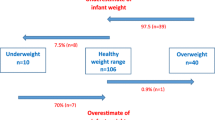Abstract
A controlling maternal feeding style has been shown to have a negative impact on child eating style and weight in children over the age of 12 months. The current study explores maternal feeding style during the period of 6–12 months when infants are introduced to complementary foods. Specifically it examines differences between mothers who choose to follow a traditional weaning approach using spoon feeding and pureés to mothers following a baby-led approach where infants are allowed to self feed foods in their solid form. Seven hundred and two mothers with an infant aged 6–12 months provided information regarding weaning approach alongside completing the Child Feeding Questionnaire. Information regarding infant weight and perceived size was also collected. Mothers following a baby-led feeding style reported significantly lower levels of restriction, pressure to eat, monitoring and concern over child weight compared to mothers following a standard weaning response. No association was seen between weaning style and infant weight or perceived size. A baby-led weaning style was associated with a maternal feeding style which is low in control. This could potentially have a positive impact upon later child weight and eating style. However due to the cross sectional nature of the study it cannot be ascertained whether baby-led weaning encourages a feeding style which is low in control to develop or whether mothers who are low in control choose to follow a baby-led weaning style.
Similar content being viewed by others
References
Ventura, A. K., & Birch, L. L. (2008). Does parenting affect children’s eating and weight status? International Journal of Behavioral Nutrition and Physical Activity, 5, e15.
Birch, L. L., Fisher, J. O., & Davison, K. (2003). Learning to overeat: Maternal use of restrictive feeding practices promotes girls eating in the absence of hunger. American Journal of Clinical Nutrition, 78, 215–220.
Lee, Y., Mitchell, D., Smiciklas–Wright, H., & Birch, L. (2001). Diet quality, nutrient intake, weight status and feeding environment of girls meeting or exceeding recommendations for total dietary fat of the American Academy of Paediatrics. Paediatrics, 107, 45–52.
Fisher, J. O., & Birch, L. L. (1999). Restricting access to foods and children’s eating. Appetite, 32, 405–419.
Faith, M. S., Scanlon, K. S., Birch, L. L., Francis, A., & Sherry, B. (2004). Parent child-feeding strategies and their relationships to child eating and weight status. Obesity Research, 12, 1711–1722.
Montgomery, C., Jackson, D. M., Kelly, L. A., & Reilly, J. J. (2006). Parental feeding style, energy intake and weight status in young Scottish children. British Journal of Nutrition, 96, 1149–1153.
Faith, M. S., & Kerns, J. (2005). Infant and child-feeding practices and childhood overweight: The role of restriction. Maternal and Child Nutrition, 1, 164–168.
Alder, E., Williams, F., Anderson, A., Forsyth, S., Florey, C., & Van der Velde, P. (2004). What influences the timing of the introduction of solid food to infants. British Journal of Nutrition, 92, 527–531.
Anderson, A., Guthrie, C., Alder, E., Forsyth, S., Howie, P., & Williams, F. (2001). Rattling the plate–reasons and rationales for early weaning. Health Education Research, 16, 471–479.
Wright, C., Parkinson, K., & Drewett, R. (2004). Why are babies weaned early? Data from a prospective population based cohort study. Archives of Disease in Childhood, 89, 813–816.
Farrow, C., & Blissett, J. (2008). Controlling feeding practices: Cause or consequence of early child weight? Pediatrics, 121, 1–6.
Farrow, C., & Blissett, J. (2006). Does maternal control during feeding moderate early infant weight gain? Pediatrics, 118, 293–298.
Department of Health. (2007). Birth to five. London UK: COI.
Seaman, C., D’Alessandro, S., & Swannie, M. (1996). Choice of weaning foods. British Food Journal, 98, 13–16.
Brown, A., & Lee, M. (2010). A descriptive study investigating the use and nature of baby-led weaning in a UK sample of mothers. Maternal and Child Nutrition,. doi:10.1111/j.1740-8709.2010.00243.x.
Rapley, G. (2006). Baby—led weaning: A developmental approach to the introduction of complementary foods. In V. Moran & F. Dykes (Eds.), Maternal and infant nutrition and nurture controversies and challenges. Malta: Gutenberg Press Ltd.
Rapley, G. & Murkett, T. (2008). Baby-led weaning: Helping your baby to love good food. Vermillon.
Reeves, S. (2008). Baby-led weaning. British Nutrition Foundation Nutrition Bulletin, 33, 108–110.
Welsh Index of Multiple Deprivation (WIMD). (2008). Summary Report, July 2008, Welsh Assembly Government, ISBN 978 0 7504 4774 4.
Survey Monkey, Portland, Oregon, USA. Copyright ©1999-2009 SurveyMonkey.com.
Birch, L. L., Fisher, J. O., Grimm-Thomas, K., Markey, C. N., Sawyer, R., & Johnson, S. L. (2001). Confirmatory factor analysis of the child feeding questionnaire: A measure of parental attitudes, beliefs and practices about child-feeding and obesity proneness. Appetite, 36, 201–210.
Dewey, K., Cohen, R., Landa Rivera, L., & Brown, K. (1998). Effects of age of introduction of complementary foods on iron status of breastfed infants in Honduras. American Journal of Clinical Nutrition, 67, 878–884.
Brown, K., Peerson, J., Rivera, J., & Allen, L. (2002). Effect of supplemental zinc on the growth and serum zinc concentration of pre pubertal children: A meta analysis of randomised, controlled trials. American Journal of Clinical Nutrition, 75, 1062–1071.
Rapley, G. (2003). Can babies initiate and direct the weaning process? Unpublished MSc interprofessional health and community studies (care of the breastfeeding mother and child). Kent: Canterbury Christ Church University College.
Department for Innovation, Universities and Skills. (2007). The level of highest qualification held by adults: England, SFR 05/2008.
Renkert, S., & Nutbeam, D. (2001). Opportunities to improve maternal health literacy through antenatal education: An exploratory study. Health Promotion International, 16(4), 381–388.
Larkin, M. (2000). Online support groups gaining credibility. Lancet, 355, 1834.
Russell, M. (2006). Netmums: Online support for parents. Community Practitioner: The journal of the Community Practitioners’ and Health Visitors Association, 2, 44–45.
Office of National Statistics. (2008). Households and individuals.
Author information
Authors and Affiliations
Corresponding author
Rights and permissions
About this article
Cite this article
Brown, A., Lee, M. Maternal Control of Child Feeding During the Weaning Period: Differences Between Mothers Following a Baby-led or Standard Weaning Approach. Matern Child Health J 15, 1265–1271 (2011). https://doi.org/10.1007/s10995-010-0678-4
Published:
Issue Date:
DOI: https://doi.org/10.1007/s10995-010-0678-4



